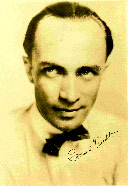
The Conrad Veidt Society


Through a Glass Darkly
A biography of Conrad Veidt
Prologue
As Balduin, the impecunious university student in Der Student von Prag, Conrad Veidt created a tragic hero who appealed to audiences around the world.
In order to obtain the riches needed to court a beautiful countess whom he loves, the impecunious student Balduin signs a pact with Scapinelli (Werner Krauss). Scapinelli will give Balduin 600,000 gold pieces, and in return he may take anything he desires from Balduin's room.
Balduin glances around his poor furnishings, laughs almost hysterically, and signs the pact. But Scapinelli is the Devil, and he has only to gesture to cause Balduin's mirror reflection to step over the threshold and into existence in the world.
Balduin's mirror image exists to do the bidding of Scapinelli. He kills Balduin's
opponent (his rival in love) in a duel -
Finally his mirror-
The Student von Prag (first filmed by Paul Wegener in 1913) introduced to the screen
'a theme that was to become an obsession of the German cinema: a deep and fearful
concern with the foundations of the self. By separating Balduin from his reflection
and making both face each other, Wegener's film [and Veidt's] symbolized a specific
kind of split personality. Instead of being unaware of his own duality, the panic-
The subject of split personality resonates with most actors, who over the course
of a career bring to life hundreds of characters that have little or no relationship
to their own, real-
Actors particularly enjoy playing a double role in a production. It gives them the opportunity to display their virtuosity (if any) in one film at one time, rather like an actor in repertory theater who can have the audience in tragic tears one night, and the very next night have them rolling in the aisles with laughter.
Conrad Veidt played dual roles in five films: Die Nacht auf Goldenhall (1919) which he directed and produced as well; Der Januskopf (1920); Die Bruder Schellenberg (1926); Der Student von Prag (1926); and Nazi Agent (1942). He played Carlos and Carlos' father in Carlos and Elisabeth (1924); and Gwynplaine and Gywnplaine's father in The Man Who Laughs (which are not the same as dual roles) He really showed his virtuosity by playing multiple roles in Satanas and Umheimliche Geschichten (1919). Did any of these 109 films appearances mirror Conrad Veidt as he truly was?
Part One
Hans Walter Conrad Veidt was born on January 22, 1893. He was born not in a hospital
but at the apartment where his family lived. His father Philipp, a former army officer,
was chancellery secretary of Berlin. His mother, Amalie, was a hausfrau. After his
brother Karl died of scarlet fever when he was nine and Conrad seven, Amalie lavished
all of her attention on her remaining son. The psychological impact of losing an
elder brother was probably a great one, as was the effect of being incessantly spoiled
by his mother to whom he was devoted, and treated coldly by an unemotional and undemonstrative
father. In later life, Conrad would say that he never got to know his father. Philipp
was a man who worked hard to provide for his family, and when he returned home wished
only to be undisturbed. He had lofty plans for his son, but was disappointed in them.
Conrad was a poor student, and would have had a hard time getting into University.
But no matter -
''All the time I spent in school or at home, or working at some boring job -
Part Two
As a child, Conrad had never dreamed of being an actor. He was an average child with
few ambitions, pampered by his mother. A memory of one day spent with her -
Veidt was not a good student. It was not that he was unintelligent -
At Hohenzollern High School, where he boarded during the week, to return to his family
on weekends, he quite often had recess-
To be continued...
This redesign sponsored by:
